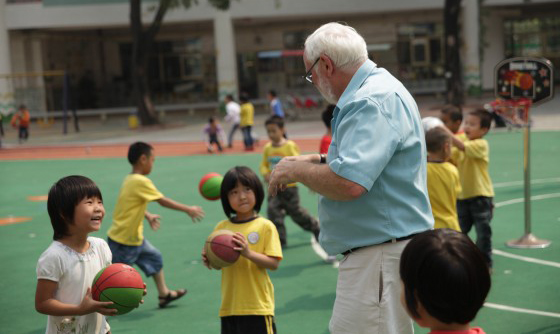In China, an ever-growing middle class with ever-growing income levels is determined to ensure their children receive the very best and the ticket to a successful future in China – as it is everywhere in the world – is a quality education.
As a result of China’s longstanding one child policy, often parents only have a single child and they are willing to go to great lengths, and expense, to make sure he or she receives the very best education. For many Chinese parents, this means university in either the US or the UK, and so they are keen to have their children attend schools in China that emulate a Western model in order to give them a head start on university studies in the West.
The educators and parents are incredibly enthusiastic, and want to make sure children receive the best education possible. One of the challenges in China, however, is translating that enthusiasm into practice.
Dr David Whitebread
Many educational providers are turning to educators in the West to assist them in the development of new schools and programmes. Dr David Whitebread, Senior Lecturer in the Faculty of Education, was approached by the Shihzu International Education Management Corporation, a Hong Kong-based charity, to help establish an English language kindergarten in China. Students will learn in both Chinese and English, in a brand new purpose-built school. The school will have a three-form entry for children aged three, four and five, with approximately 200 in each year.
Dr Whitebread and his colleagues are undertaking the large-scale project, which encompasses everything from designing the building and developing a curriculum to hiring and training the teachers, with the assistance of the Consultancy Services team at Cambridge Enterprise. Consultancy Services negotiated an agreement that was modified to cope with the complexities associated with dealing with a Chinese company, and subcontracted some services to Heather Lowe, headteacher of Homerton Children’s Centre, and Sue Bingham, a qualified Montessori teacher who has recently completed a PhD on the emotional development of young children, under the supervision of Dr Whitebread.
While China’s relationship with the West is complex in many respects, when it comes to education, there is a great desire to emulate Western models. “The educators and parents are incredibly enthusiastic, and want to make sure children receive the best education possible,” says Dr Whitebread. “One of the challenges in China, however, is translating that enthusiasm into practice. You walk into a Chinese kindergarten and there are mottos and quotations from Western educational figures such as Montessori and Froebel all over the walls, but the practice doesn’t bear any resemblance to them. The teachers have learned the words, but they’ve got to internalise what they mean.”
The traditional teaching method in China is didactic, characterised by chanting and repetition. However, many Chinese educators are keen to diverge from traditional methods in favour of curricula that embrace active learning. “I think at a societal level, the Chinese are very good at solving what I call convergent problems, and following instructions,” Dr Whitebread says. “However, their self-perception is that they’re not very creative and they’re not very good at problem-solving. You can understand why they may think that about themselves when you see the way in which they learn at school.”
While the project is long-term and complex, it poses an exciting challenge for Dr Whitebread. “The people we’re working with are very well-informed and keen to do it right.” However, he cautions, the project will take time. “You can’t just take an English model and directly transfer it to China. I don’t want to end up with something that looks exactly like a Western kindergarten; it’s got to be a Chinese kindergarten.”
Recruitment for the school’s first headteacher is underway, and the school is expected to open in September 2012. Dr Whitebread stresses the importance of the help and expertise of the Consultancy Services team. “I’ve done little projects over the years, but I wouldn’t dream of doing any of these large-scale projects without them. We’re fortunate to be working in the best university in the world, and we should have a huge international outreach, particularly in an educational capacity. Projects of this size would be very difficult to do without having the resources which Cambridge Enterprise provides.”
Photo credit: Kunming morning by Jeff Knezovich via Flickr
Feature photo credit: David Whitebread











